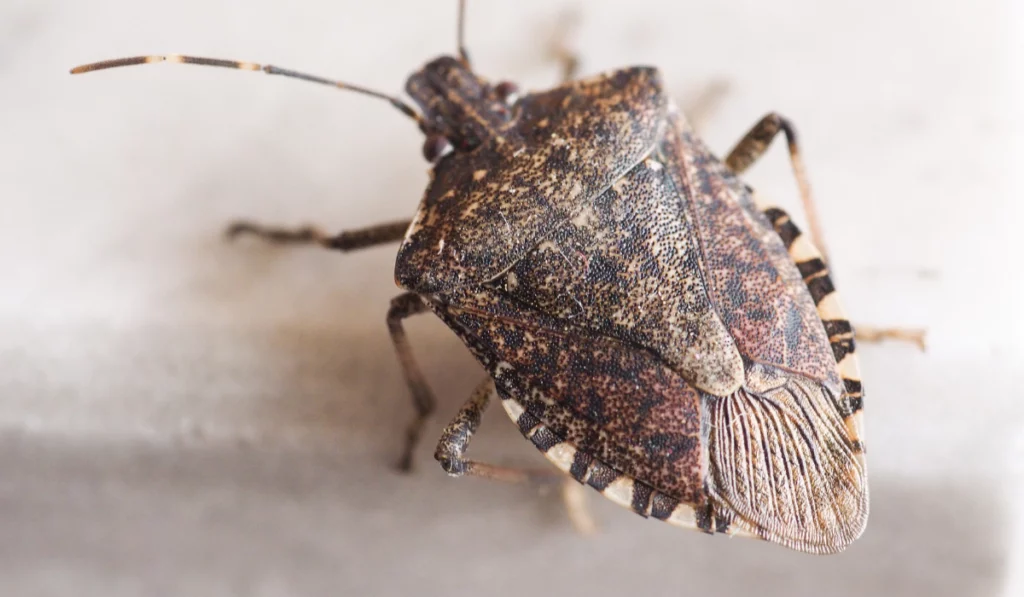A Good Stinkin’ Goodbye: How to Get Rid of Stink Bugs at Home
Stink bugs are not the scariest of pests, but they’re certainly the most stinky, and an encounter with one can leave your home smelling foul for days. These pesky creatures have invaded 15 states and are set to increase their population by 70% in the next few decades.
If you’ve noticed multiple stink bugs in your home, it’s best to get ahead of the problem early and call a pest control professional. But before your exterminator arrives, there are steps you should take on your own to keep the problem at bay and prevent future stinky invasions. Read on to learn everything you need to know about fending off stink bugs.
Key Takeaways
- Stink bugs are attracted to light, heat, and warmth, particularly when they’re seeking shelter for the winter.
- When disturbed, stink bugs emit a foul odor akin to something rotting or burning (but aside from the smell, they’re generally harmless).
- Using traps, insecticides, or natural remedies like diatomaceous earth can help you fend off a stink bug invasion in your home.
- If you notice multiple stink bugs congregating in your home, dead or alive, you may have an infestation. It’s best to call a professional immediately.
What Attracts Stink Bugs?

The brown marmorated stink bug is a simple creature. They’re attracted to light (particularly blue-tinted light), warmth, and shelter, as well as the scent of certain chemical pheromones. When stink bugs find a safe, warm place suitable to stay in for the winter (“overwinter”), they’ll release aggregation pheromones to attract other stink bugs to the area.
Contrary to the popular misconception, the scent of a stink bug that’s been squashed will not attract other stink bugs to the area–the aggregation pheromone and the “stinky” chemical are two separate entities.
In most cases, stink bugs that wander into your home are simply attracted to the light, warmth, and shelter it provides, particularly in harsh weather conditions. These shield-shaped critters are also herbivores, so they prefer rural settings with lots of greenery to munch on.
Are Stink Bugs Harmful?
Stink bugs are not harmful to humans, are not toxic, and do not typically carry diseases. They don’t sting or bite, so their only natural form of defense is their signature “stink.” Some people are sensitive to the chemicals stink bugs emit and may experience minor skin reactions if they come into contact with them.
You should be cautious around stink bugs regardless, because startling them will cause them to release that potent defense chemical and immediately stink up your house. If you see one, avoid touching or disturbing it unless absolutely necessary.
What Do Stink Bugs Smell Like?
The scent stink bugs emit is described differently by different people, but all agree that the creatures live up to their name–the aroma that results from squishing one is potent and foul.
Some say the stink bug scent is akin to cooking cilantro, while others describe it as similar to that of a skunk spraying. Others compare it to sulfur, ammonia, rotten meat or fruit, or burning tires. The rancid scent spreads quickly, particularly when there are multiple bugs, and some species can spray it up to several inches away from their bodies.
How to Get Rid of Stink Bugs (Fast)
Below is a list of proven methods for curbing your stink bug infestation as fast as possible (while minimizing your risk of dealing with that pesky odor).
Sticky Traps
You can purchase DIY sticky traps made specifically for stink bugs on Amazon or at any hardware store. These sticky sheet traps often include aggregation pheromone technology to lure and trap stink bugs. You can simply set out the stink bug trap in the area of your home where you’ve seen stink bugs, wait until they crawl onto it, and dispose of it.
Vacuum
Vacuuming stink bugs is the perfect way to get them out of your home without dealing with the stinky consequences of squashing them. Vacuuming stink bugs is quick and can help you get rid of multiple bugs at once, but keep in mind that your vacuum cleaner may stink afterwards.
Diatomaceous Earth
Diatomaceous earth is lethal to any insect with an exoskeleton, stink bugs included. A powder made from fossilized algae, this substance feels like dust to humans but is sharp to bugs with exoskeletons–akin to walking on glass. Once they come in contact with the powder, their exoskeletons are cut open, causing them to dehydrate and die.
Neem Oil
Found in seeds of the neem tree, neem oil is a naturally-occurring pesticide that comes in a spray bottle. Neem oil can defeat an infestation in a variety of ways. Not only does it repel bugs, but it also prevents them from feeding and acts as birth control. By interfering with their hormones, neem oil deters bugs’ ability to grow and lay eggs.
Be cautious when treating your home with neem oil, as it can irritate your eyes and skin. Not to mention, the substance gives off a bit of a garlic and sulfur scent of its own (so pick your poison).
Insecticides
Treating your home or yard with an EPA-approved insecticide is a surefire way to eliminate your stink bug infestation. Insecticides can kill or repel stink bugs, and they also prevent them from congregating in or near your home. Spraying your yard with insecticides can also prevent stink bugs from eating your plants.
– – –
🐜 Sacramento Pest Control Service
Get Your First Service For Only $67
Limited Time Offer
– – –
Preventing Stink Bugs
If you’ve noticed a stink bug or two in or around your home, there are steps you can take to prevent a full-blown infestation.
Seal Entry Points
Sealing points of entry to your home is a surefire way to ensure no stink bugs can get in. Keep doors and windows sealed shut whenever possible, and caulk up any cracks, crevices, or holes in your walls. Any hole with a diameter larger than a pencil is fair game for a stink bug to squeeze through unless you patch it up.
Install Screens
Installing screens over windows and behind sliding doors can prevent stink bugs from entering your home. Placing screens over vents and over any exposed entrances to your attic, crawl space, or basement is also a good idea.
Maintain Good Hygiene
Maintaining good hygiene is always best practice when it comes to preventing pests, stink bugs included. Be sure to clean your home regularly, particularly staying on top of promptly cleaning up crumbs and spills in your kitchen.
Stink bugs feed on a variety of plants, including fruits, and any source of food will keep them coming in large numbers. Mopping and wiping down surfaces will keep your home fresh while also offsetting those aggregation pheromones released by any stink bugs that make it inside in the first place.
When to Call a Professional
Spotting a stink bug or two in your home is no cause for concern, but seeing multiple bugs, dead or alive, is a telltale sign of an infestation. Stink bug infestations grow quickly, thanks to that aggregation pheromone, so it’s best for homeowners to call a professional as soon as suspicion arises. A pest control expert can help you curb your stink bug problem fast, while also bug-proofing your home to keep stink bugs out and prevent future stinky encounters.



